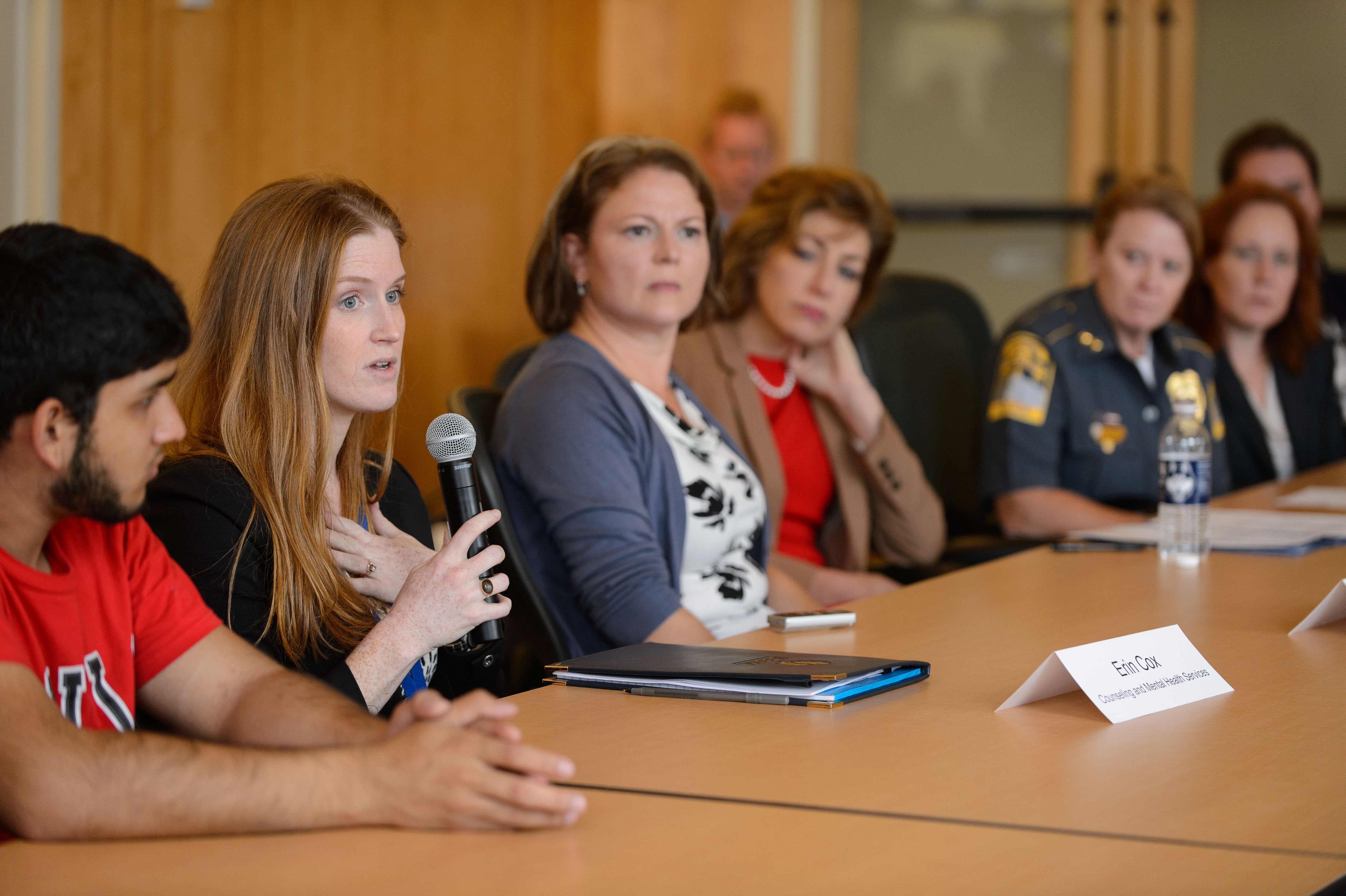
UConn students play a critical and much-appreciated role in helping ensure a safe, nurturing campus community as officials continuously refine the University’s emergency response plans, participants were told at a forum this week.
The roundtable, held Wednesday, comes in the wake of several shootings in recent weeks on college campuses nationwide. UConn President Susan Herbst and Police Chief Barbara O’Connor both emphasized at the discussion that although UConn is a very safe campus, emergency planners are constantly working on prevention and response initiatives.

Several of those initiatives were outlined Wednesday at the event, which included about 40 students along with panelists Eleanor Daugherty, UConn’s dean of students; Erin Cox, a clinical psychologist from UConn Counseling and Mental Health Services; and Sandra Chafouleas, associate dean and professor in the Neag School of Education.
Herbst convened the roundtable to discuss UConn’s preparation and prevention initiatives, to field questions and take suggestions about those measures, and to help assure students, their parents, UConn employees, and others in the community that the issues are being closely watched.
“Campuses have never been immune from horrific tragedies, but it feels as though these incidents are happening with increasing frequency,” Herbst said. “Colleges and universities are places of learning, friendship, discovery, and innovation. To have the peace and security of a campus shattered by violence is abhorrent to us, and the specter of it is what keeps people like me and Chief O’Connor up at night. At the same time, we can’t and won’t live our lives in fear.”
UConn has a robust emergency preparedness, notification, and response system that includes text message alerts, a continuously updated Alert site (www.alert.uconn.edu), frequent drills and emergency tests, and ongoing training for police officers, fire crews, and other emergency responders.
UConn’s Office of Emergency Management also recently posted updated guidelines for the campus community on response to various potential emergencies, including what to do if an active shooter is reported on campus, if informed to “shelter in place,” and in other situations.
O’Connor told students in attendance at Wednesday’s discussion that they also urge students to notify them if they notice anything unusual, such as a worrisome social media posting, a fellow student acting oddly, or other occurrences that raise their curiosity or concern.
“We prepare, we drill, we plan – all of those things are very important – but a lot of this is also about prevention,” O’Connor said. “People say you can’t predict these things and that’s absolutely true, but it’s not about predicting these things; it’s about putting resources into preventing harm, and that’s where students come in and can be really helpful.”
The panelists said they recognize that many students have a very active life on social media, and that it gives their generation a unique window to notice unusual behavior and help those individuals get help before they harm themselves and others.
Cox said they also give similar guidance to professors, resident assistants, and others to watch for people who may be in crisis – those who have stopped leaving their room, who have disappeared from class, or who may be isolating themselves or displaying other warning signs.
She said that people who come to Counseling and Mental Health Services can get more than therapy; the staff are also connected with offices throughout campus, and can help the students navigate through academic and other problems that may be contributing to their emotional difficulties.
Daugherty agreed, saying part of the University’s mission is to create an atmosphere where people feel safe enough to explore ideas outside of their comfort zone and learn from others with different backgrounds.
“That’s my bottom line: How do we work together as an institution to provide a home for students that people desire and aspire to be at, and where they will experience things that are different? The last thing we want to do is to walk around in fear on our campus,” she said.
“To feel stressed at midterms or during busy times is a normal experience. But to feel alone on campus, or to feel as though you don’t matter or aren’t part of a greater community, is not something that should be happening,” she said.
Chafouleas, who has studied the issue as it pertains to children in kindergarten through 12th grade, agreed and said research finds that young people’s mental well-being is enhanced when they are in an environment where they feel that others care about them, that they have someone to talk with, and that support is available when they need it.



